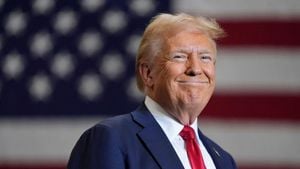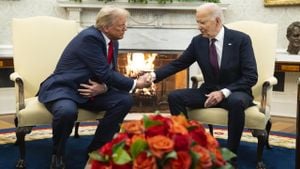The political atmosphere of Uruguay shifted significantly on November 24, 2024, with the election of Yamandú Orsi as the nation’s new president. This leftist contender emerged victorious from a tightly contested runoff against Álvaro Delgado of the ruling center-right National Party. Orsi's success signals not just his triumph but reflects larger anti-incumbent sentiments rippling through many democracies worldwide.
Orsi, the candidacy backed by the leftist Broad Front coalition, clinched approximately 49.8% of the votes, narrowly edging out Delgado, who garnered around 45.9%. Even as polls showed the candidates nearly neck-and-neck throughout the campaign, Orsi's supporters erupted with jubilant celebrations across the capital, Montevideo, upon learning of their candidate's lead.
Álvaro Delgado, who faced defeat, reportedly muted the party's mood by graciously conceding the election. Surrounded by solemn supporters, he stated, “With sadness, but without guilt, we can congratulate the winner… it's one thing to lose the elections and another to be defeated. We are not defeated,” reminding his followers of their resilience.
Yamandú Orsi, at 57, carries the charisma of the working class and has molded his identity from humble beginnings as a history teacher before rising as mayor of Canelones, Uruguay's second largest region. Influenced by the political ideology of former leftist icon, José “Pepe” Mujica, Orsi promises to bring about change reminiscent of Uruguay's liberal policies established during the Broad Front's previous rule, which lasted from 2005 until 2019. Under this era, Uruguay became known for significant legislative advances, including the legalization of same-sex marriage and regulated cannabis sales.
During his victory address, Orsi appealed for unity, stating, “I will be the president who calls for national dialogue again and again, who builds a more integrated society and country.” This commitment to inclusivity is particularly notable considering the election's tight margins amid feelings of political disenchantment.
To address issues his constituents have raised, particularly rising poverty affecting around 25% of the population, Orsi plans to launch programs targeting childhood poverty and homelessness. He underscored the need for moderate security reforms to counter increasing crime rates without pushing away labor support from unions.
Despite the excitement surrounding his win, challenges lie ahead for Orsi. He takes office amid concerns over economic stagnation and crime. The landlocked nation of 3.4 million is perceived as stable, yet its economic growth has been hampered due to issues such as changing cocaine trafficking patterns and related violence.
Political analysts suggest Orsi’s campaign struggled with voter apathy and ineffective outreach to younger constituents. Critics pointed out hesitance on his part to divulge specific policy changes during the election, particularly concerning his approach to crime and safety, calling his discussions “vague.” Still, many voters respond positively to his moderate approach, appreciating his openness to dialogue across political divides.
Historically, Uruguay has enjoyed relatively stable political environments, typically free from the extreme polarization seen elsewhere, such as Argentina or the United States. Orsi’s prior political experiences and solid relationships with business sectors may prove advantageous as he attempts to maintain safety nets for workers alongside the need for economic growth.
Orsi's future administration will find itself managing the broader public discontent expressed through the electoral process. Turnout hit nearly 90%, mandated by compulsory voting laws, reacting to growing demands for change. Observers noted the culture of dialogue surpasses the divisive anger often accompanying recent global elections.
With such expectations and pressures looming, Orsi seeks to revitalize the Broad Front’s image as not just politically viable but also capable of steering the country toward recovery from post-COVID malaise. His focus will be on enhancing social programs, increasing funding to beneficial municipal projects, and retaining positive investment environments for firms old and new. The emboldening vision of combining fiscal conservatism with social welfare drives Orsi’s agenda as he gears to settle contentious internal debates over punitive reforms.
Only time will tell how Orsi balances these responsibilities. But one thing is clear: the people of Uruguay have once again selected their leader, believing firmly their call for dialogue and change can create the society they envision. After years of the conservative grip on power, Orsi's victory is imbued with the promise of revitalized progressivism, whether viewed through the lens of nostalgia or hope for the future.



